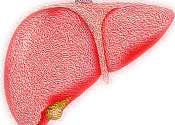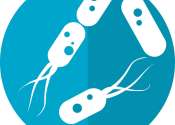Last update:
Gastroenterology news
Diseases, Conditions, Syndromes
How doxycycline for STI prevention affects the gut microbiome
Taking a dose of the oral antibiotic doxycycline after a high-risk sexual encounter has dramatically reduced the incidence of sexually transmitted infections (STIs) in places where the strategy is being tried.
6 hours ago
0
7
Medical research
Tuft cells act as regenerative stem cells in the human intestine, study finds
Intestinal tuft cells divide to make new cells when immunological cues trigger them. Additionally, in contrast to progenitor- and stem cells, tuft cells can survive severe injury such as irradiation damage, and contribute ...
16 hours ago
0
15
Microbiome-directed food speeds recovery in children with severe acute malnutrition, trial finds
A team of biologists, nutritionists and gut biome specialists has found via a trial run at several hospitals in Bangladesh that giving children suffering from severe malnutrition a microbiome-based food helps them recover ...

Certain dietary factors, blood lipids can affect gastroesophageal reflux disease
An increase in total cereal intake and total cheese intake may reduce the risk for gastroesophageal reflux disease (GERD), according to a study published online Sept. 6 in the European Journal of Nutrition.
6 hours ago
0
0

AI may help predict risk of Barrett's esophagus and esophageal cancer
Precancerous changes in the cells of the esophagus, a condition called Barrett's esophagus, is a risk factor for esophageal cancer. Barrett's esophagus is caused by gastroesophageal reflux disease (GERD), which occurs when ...
12 hours ago
0
0

Gut microbe imbalances could predict a child's risk for autism, ADHD and speech disorders years before symptoms appear
Early screening for neurodevelopmental disorders such as autism is important to ensure children have the support they need to gain the essential skills for daily life. The American Academy of Pediatrics recommends that all ...
Oct 2, 2024
0
1

GLP-1 weight-loss meds could interfere with endoscopy, colonoscopy
Food left in the stomach or stool left in the bowel can impede a doctor's ability to successfully perform an endoscopy or colonoscopy.
Oct 1, 2024
0
15

Q&A: Why your flu shot might come with a colon cancer test
Colorectal cancer cases are rising among younger people, striking even folks without obvious risk factors.
Oct 1, 2024
0
0

Study highlights pervasiveness of inflammation in American diet
Almost 6 in 10 Americans have pro-inflammatory diets, increasing the risk of health problems including heart disease and cancer, according to a new study that used a tool designed to examine inflammation in the diet.
Oct 1, 2024
0
1

Research shows that few with abnormal protein dipstick results have albuminuria testing
Few patients with abnormal protein dipstick results have follow-up albuminuria quantification, according to a research letter published online Oct. 1 in the Annals of Internal Medicine.
Oct 1, 2024
0
0

Button cells: Serious health damage possible for small children if swallowed
If button cells are swallowed, they may get stuck in the esophagus. This can sometimes lead to severe damage to the mucous membranes. "Over the past 10 years, clinics and poison centers have reported several hundred cases ...
Oct 1, 2024
0
0

Creating a more accurate model of inflammatory bowel disease
A research team led by Junior Associate Professor Kazuo Takayama, from the Department of Cell Growth and Differentiation, recently constructed a new model of inflammatory bowel disease using iPS cells that enables more accurate ...
Sep 30, 2024
0
56

Thaumatin, a natural sweetener with anti-inflammatory potential
A new study by the Leibniz Institute for Food Systems Biology at the Technical University of Munich shows for the first time that bitter tasting protein fragments (peptides) are produced in the stomach during the digestion ...
Sep 30, 2024
0
0

How alcohol-associated liver disease differs among races
Researchers have long known that outcomes for alcohol-associated liver disease (ALD) aren't equal among all races and ethnicities in the U.S., but differences among these groups have been less clear.
Sep 29, 2024
0
8

Circadian disruption, gut microbiome changes linked to colorectal cancer progression
Research from the University of California, Irvine has revealed how disruption of the circadian clock, the body's internal, 24-hour biological pacemaker, may accelerate the progression of colorectal cancer by affecting the ...
Sep 28, 2024
0
30

Growing up with a dog may be good for your gut health, study finds
Dog lovers can attest to the range of benefits that come with having a canine companion, but improved gut health likely isn't one of them.
Sep 27, 2024
0
137

Racial disparities found to exist in emergency department treatment of children with unintentional ingestions
Unintentional injuries like falls, drownings and poisonings are the leading cause of death in patients ages 1–4, and a significant portion of these deaths are linked to unintentional ingestion—such as swallowing a drug ...
Sep 27, 2024
1
0

Researchers discover new bacterium that causes gut immunodeficiency
Cleveland Clinic researchers have discovered a new bacterium that weakens the immune system in the gut, potentially contributing to certain inflammatory and infectious gut diseases.
Sep 26, 2024
0
98

Organoids derived from gut stem cells reveal two distinct molecular subtypes of Crohn's disease
Crohn's disease—an autoimmune disorder—is characterized by chronic inflammation of the digestive tract, resulting in a slew of debilitating gastrointestinal symptoms that vary from patient to patient. Complications of ...
Sep 26, 2024
0
67

Phase II results suggest targeted therapy is effective for moderate to severe ulcerative colitis
An international placebo-controlled study led by Cedars-Sinai suggests that a targeted drug therapy that was developed by researchers at Cedars-Sinai is safe and effective at helping people with moderate to severe ulcerative ...
Sep 26, 2024
0
36

Q&A: Study identifies potential new treatment for liver fibrosis
New research from the University of Pittsburgh School of Pharmacy sheds light on the processes that lead to liver fibrosis and suggests a novel treatment approach for this common and serious condition.
Sep 25, 2024
0
0

Campylobacter jejuni-specific antibody gives hope to vaccine development
Bacterial infections resulting in enteritis, and sometimes extra-intestinal infections such as sepsis, continue to be a global health concern. A leading cause of diarrheal and extra-intestinal infectious mortality among children ...
Sep 25, 2024
0
8

Blueberry-derived compound shows promise in enhancing colonic mucosal barrier function
A research team from Shenyang Agricultural University, led by Dr. Bin Li, has highlighted the potential of malvidin-3-O-galactoside (M3G), a blueberry-derived anthocyanin, to improve colonic mucosal barrier function and alleviate ...
Sep 25, 2024
0
0

Study reveals link between microbiome and aggression in mice
A new study led by Prof. Omry Koren and graduate student Atara Uzan-Yuzari from the Azrieli Faculty of Medicine at Bar-Ilan University has unveiled significant evidence connecting the gut microbiome to aggressive behavior ...
Sep 23, 2024
0
4

Paternal gut health may affect the physical and mental health of offspring
Florey researchers have shown, for the first time, that a father's gut health plays a role in offspring physiology and behavior.
Sep 23, 2024
0
0







































